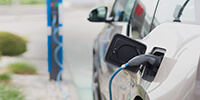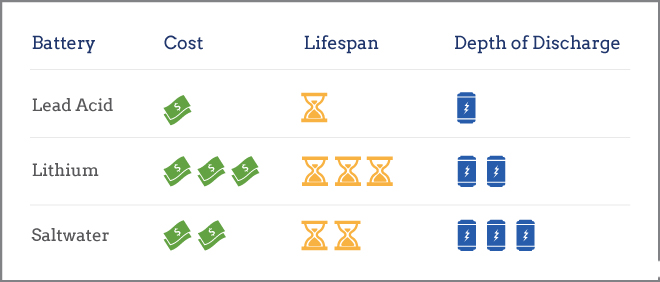How long do solar batteries last?
|
There are two ways to answer this question and the first is to determine how long a solar battery can power your home. In many cases, a fully charged battery can run your home overnight when your solar panels are not producing energy. To make a more exact calculation, you'll need to know a few variables, including how much energy your household consumes in a given day, what the capacity and power rating is for your solar battery and whether or not you are connected to the electric grid. For the sake of a simple example, we'll determine the size of a battery needed to provide an adequate solar plus storage solution with national average data from the U.S. Energy Information Administration. The average U.S. household will use roughly 30 kilowatt-hours (kWh) of energy per day and a typical solar battery can deliver some 10 kWh of capacity. Thus a very simple answer would be, if you purchased three solar batteries, you could run your home for an entire day with nothing but battery support. In reality, the answer is more complicated than that. You will also be generating power with your solar panel system during the day which will offer strong power for some 6-7 hours of the day during peak sunlight hours. On the other end, most batteries cannot run at maximum capacity and generally peak at a 90% DoD (as explained above). As a result, your 10 kWh battery likely has a useful capacity of 9 kWh. Ultimately, if you are pairing your battery with a solar PV array, one or two batteries can provide sufficient power during nighttime when your panels are not producing. However, without a renewable energy solution, you may need 3 batteries or more to power your entire home for 24 hours. Additionally, if you are installing home energy storage in order to disconnect from the electric grid, you should install a few days' worth of backup power to account for days where you might have cloudy weather. Solar battery lifespanThe general range for a solar battery's useful lifespan is between 5 and 15 years. If you install a solar battery today, you will likely need to replace it at least once to match the 25 to 30 year lifespan of your PV system. However, just as the lifespan of solar panels has increased significantly in the past decade, it is expected that solar batteries will follow suit as the market for energy storage solutions grows. Proper maintenance can also have a significant effect on your solar battery's lifespan. Solar batteries are significantly impacted by temperature, so protecting your battery from freezing or sweltering temperatures can increase its useful life. When a PV battery drops below 30° F, it will require more voltage to reach maximum charge; when that same battery rises above the 90° F threshold, it will become overheated and require a reduction in charge. To solve this problem, many leading battery manufacturers, like Tesla, provide temperature moderation as a feature. However, if the battery that you buy does not, you will need to consider other solutions like earth-sheltered enclosures. Quality maintenance efforts can definitely impact how long your solar battery will last. What are the best batteries for solar?Batteries used in home energy storage typically are made with one of three chemical compositions: lead acid, lithium ion, and saltwater. In most cases, lithium ion batteries are the best option for a solar panel system, though other battery types can be more affordable. 1. Lead acidLead acid batteries are a tested technology that has been used in off-grid energy systems for decades. While they have a relatively short life and lower DoD than other battery types, they are also one of the least expensive options currently on the market in the home energy storage sector. For homeowners who want to go off the grid and need to install lots of energy storage, lead acid can be a good option. 2. Lithium ionThe majority of new home energy storage technologies, such as the , use some form of lithium ion chemical composition. Lithium ion batteries are lighter and more compact than lead acid batteries. They also have a higher DoD and longer lifespan when compared to lead acid batteries. However, lithium ion batteries are more expensive than their lead acid counterparts. 3. SaltwaterA newcomer in the home energy storage industry is the saltwater battery. Unlike other home energy storage options, saltwater batteries don’t contain heavy metals, relying instead on saltwater electrolytes. While batteries that use heavy metals, including lead acid and lithium ion batteries, need to be disposed of with special processes, a saltwater battery can be easily recycled. However, as a new technology, saltwater batteries are relatively untested, and the one company that makes solar batteries for home use (Aquion) filed for bankruptcy in 2017. |














